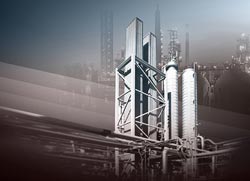Takreer selects Zimpro wet air oxidation system by Siemens for refinery spent caustic treatment

One of the advanced technologies that will help TAKREER meet environmental regulations, the WAO system will treat odorous sulfides and produce biodegradable effluent for discharge to the facility's effluent treatment plant. The expansion project is scheduled to be complete by late 2013.
The refinery expansion project will increase crude oil refining capacity by 417,000 barrels per day using the latest advanced technology for downstream processing units to produce higher quality products and to comply with UAE and international environmental standards. The Zimpro wet air oxidation system will be part of the new downstream units.
Wet oxidation is the oxidation of soluble or suspended components in an aqueous environment, using oxygen as the oxidizing agent. When air is used as the source of oxygen, the process is referred to as wet air oxidation (WAO). The process will oxidize odorous reduced sulfur species such as sulfides and mercaptides. WAO can pretreat difficult wastewater streams like refinery spent caustic, making them amenable for discharge to a conventional biological treatment plant for polishing.
Siemens Industry Automation Division is working closely with Siemens in Seoul, Korea and EPC firm SK Engineering & Construction Co., Ltd on the Takreer contract.
The Abu Dhabi Oil Refining Company (TAKREER) is a subsidiary of the Abu Dhabi National Oil Company (ADNOC). A leader in the UAE refining industry, Takreer has been responsible for such refining operations as the crude oil, condensate refining, and supply of petroleum products since 1999.
Zimpro is a trademark of Siemens and/or its affiliates in some countries.
The Siemens Industry Sector (Erlangen, Germany) is the world's leading supplier of innovative and environmentally friendly products and solutions for industrial customers. With end-to-end automation technology and industrial software, solid vertical-market expertise, and technology-based services, the Sector enhances its customers' productivity, efficiency, and flexibility. With a global workforce of more than 100,000 employees, the Industry Sector comprises the Divisions Industry Automation, Drive Technologies and Customer Services as well as the Business Unit Metals Technologies. For more information, visit http://www.siemens.com/industry
The Siemens Industry Automation Division (Nuremberg, Germany) supports the entire value chain of its industrial customers – from product design to production and services – with an unmatched combination of automation technology, industrial control technology, and industrial software. With its software solutions, the Division can shorten the time-to-market of new products by up to 50 percent. Industry Automation comprises five Business Units: Industrial Automation Systems, Control Components and Systems Engineering, Sensors and Communications, Siemens PLM Software, and Water Technologies. For more information, visit http://www.siemens.com/industryautomation
Reference Number: IIA2012022818e
Contact
Mr. Peter Jefimiec
Industry Automation Division
Siemens AG
Gleiwitzerstr. 555
90475 Nuremberg
Germany
Tel: +49 (911) 895-7975
peter.jefimiec@siemens.com
Contact USA
Mr. Allison Britt
Water Technologies Business Unit
Siemens Industry, Inc.
2501 N. Barrington Rd.
Hoffman Estates
IL 60192
USA
Tel: +1 (847) 713-8477
allison.britt@siemens.com
Media Contact
More Information:
http://www.siemens.com/waterAll latest news from the category: Machine Engineering
Machine engineering is one of Germany’s key industries. The importance of this segment has led to the creation of new university degree programs in fields such as production and logistics, process engineering, vehicle/automotive engineering, production engineering and aerospace engineering among others.
innovations-report offers informative reports and articles covering technologies such as automation, motion, power train, energy, conveyor, plastics, lightweight construction, logistics/warehousing, measurement systems, machine tools and control engineering.
Newest articles

NASA: Mystery of life’s handedness deepens
The mystery of why life uses molecules with specific orientations has deepened with a NASA-funded discovery that RNA — a key molecule thought to have potentially held the instructions for…

What are the effects of historic lithium mining on water quality?
Study reveals low levels of common contaminants but high levels of other elements in waters associated with an abandoned lithium mine. Lithium ore and mining waste from a historic lithium…

Quantum-inspired design boosts efficiency of heat-to-electricity conversion
Rice engineers take unconventional route to improving thermophotovoltaic systems. Researchers at Rice University have found a new way to improve a key element of thermophotovoltaic (TPV) systems, which convert heat…



